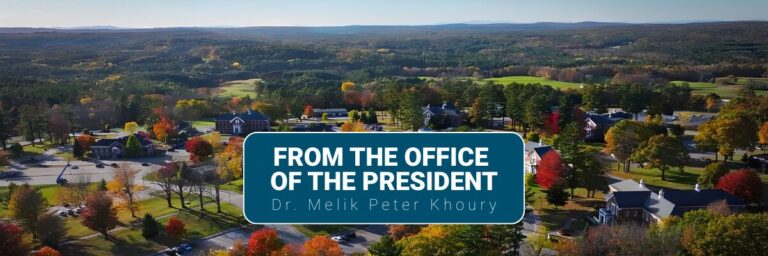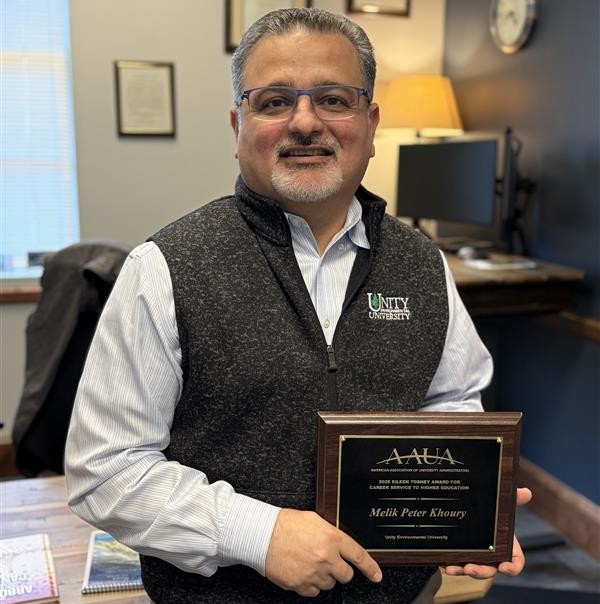Ground-breaking “green” innovations such as the award-winning TerraHaus, the first student residence on a college or university campus built to the Passive House standard, the most energy efficient building standard in the world, have brought distinction to the College. Unity is also the first college in the United States to divest from investments in fossil fuels, igniting a growing national movement in higher education.
Not too long ago, Stanford University followed Unity’s lead and agreed to divest its $18.5 billion endowment from investments in coal stocks.
Not only has word of Unity’s leadership spread across the United States, the College has gained international praise and was nominated as the Green University of the Year for the 2013 Climate Change Award by Responding to Climate Change. This international award recognized Unity College for its green leadership. Unity College was the only institution of higher learning from the United States to be nominated.
In recent years, in-line with the goal of real-world experiences related to their study major, students have travelled to places like Panama, where they worked with rural villagers on agricultural issues. One Unity College student pursued an internship at a panda research center in China, while another worked on a documentary film about sustainability issues in Iceland.
“Our students engage the world and are a part of everything the College does,” said Unity College President Stephen Mulkey, who pointed out that students helped to design TerraHaus and lead educational tours through the building. “We empower our students to make a difference and prepare them to meet the environmental challenges of the 21st century.”
Executive Vice President and Liaison to the Board Dr. Melik Peter Khoury says one explanation for its vast appeal and growing national reputation is not because at Unity College, the paradigm is to think outside the box, it is because there is no box.
Though the College now enjoys its highest campus occupancy rate and is increasing the geographic diversity of its study body, it will continue to improve the ethnic and racial diversity of the entire community, says Khoury. Efforts are underway to attract more international students. The College is also developing online and graduate programming.
The hiring of additional faculty and staff will continue to build awareness about Unity College, enhance academic offerings, and improve flexibility. These factors, combined with new staff hires in marketing, recruitment, fundraising, grant writing, online education, and graduate education, will maximize growth potential.
“Unity College is developing a model to ensure that graduates have the skills to be in demand the day they graduate, and continue to be relevant as the green economy develops jobs that are not even in existence today,” Khoury said. President Mulkey says that students deserve more from their college experience than lectures, laboratories, and a diploma at commencement. They deserve to be full partners in their own education, working within a supportive system that helps them make important connections across the disciplines, a fundamental feature of a Unity College education.
Students pursue hands-on projects that link lessons from classes across the spectrum. They enjoy opportunities to gain valuable experience before they graduate, and many students study alongside faculty members, or are employed by academic studies.
Students take advantage of internships that seek to erase the boundaries between the classroom and professional world beyond its walls.
Derrick Maltman ’14, a Captive Wildlife Care and Education major from Zanesville, Ohio, spent the summer of 2013 pursuing his dream internship at the Zoological Center in Tel Aviv, Israel.
The Career Resource Center arranged a Skype interview for Maltman with the zoo. The interviewer spoke fluent English and said that Maltman’s inability to speak Hebrew would not pose an obstacle to the pursuit of a successful internship. Even so, Maltman intensively studied Hebrew. He also wrote a blog about his experience that was posted on the College website.
In recent years Unity College, which is known as America’s Environmental College, has gained national attention for a variety of achievements including: its focus on sustainability science, operating at the leading-edge of 21st century ecological problem solving, and being the vanguard in the fight for the mitigation of global climate change. The college’s ground-breaking “green” innovations such as the award-winning TerraHaus, which is the first student residence on a college or university campus built to the Passive House standard, operates at the most energy efficient building standard in the world. Unity College is the first college in the United States to divest from investments in fossil fuels. This action ignited a growing national movement in higher education that recently welcomed Stanford University to the fold.
Unity College students have ample opportunities to pursue research as undergraduates. In 2013, the College began a multi-year black bear study in central Maine. The study is the first in the United States to directly involve college undergraduates in the trapping and tracking of bears, specifically, Maine black bears. A variety of media across the United States have featured stories about the Unity College Bear Study, including National Public Radio and the Animal Planet reality television show North Woods Law.
Through its hands-on experiential approach to learning plus a sustainability science focus for teaching and learning, Unity College prepares students not only for current environmental careers, but also for careers that are only now being imagined.
Students develop skills and experiences that employers prize as they pursue internships across the United States and internationally in countries like Israel, Namibia, Belize, Iceland, and China.



